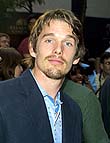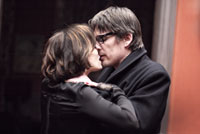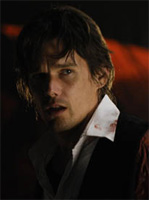Richard Linklater Boyhood
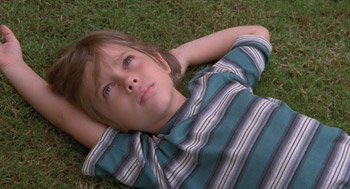
Richard Linklater Boyhood
Cast: Patricia Arquette, Ellar Coltrane, Ethan Hawke
Director: Richard Linklater
Genre: Drama
Rated: MA
Running Time: 163 minutes
Synopsis: Filmed over short periods from 2002 to 2013, Boyhood is a groundbreaking cinematic experience covering 12 years in the life of a family. At the center is Mason, who with his sister Samantha, is taken on an emotional and transcendent journey through the years, from childhood to adulthood.
Boyhood
Release Date: June 6th, 2014
About The Production
"Time is a river which sweeps me along, but I am the river." - Jorge Luis Borges
Richard Linklater's Boyhood - a fictional drama made with the same group of actors over a 12-year period - takes a one-of-a-kind trip, at once epic and intimate, through the exhilaration of childhood, the seismic shifts of a modern family and the very passage of time.
The film tracks 6 year-old Mason (Ellar Coltrane) over life's most radically fluctuating decade, through a familiar whirl of family moves, family controversies, faltering marriages, re-marriages, new schools, first loves, lost loves, good times, scary times and a constantly unfolding mix of heartbreak and wonder. But the results are unpredictable, as one moment braids into the next, entwining into a deeply personal experience of the incidents that shape us as we grow up and the ever-changing nature of our lives.
As the story begins, dreamy-eyed grade-schooler Mason faces upheaval: his devoted, struggling single mom Olivia (Patricia Arquette) has decided to move him and older sister Samantha (Lorelei Linklater) to Houston – just as their long-absent father Mason Sr. (Ethan Hawke) returns from Alaska to re-enter their world. Thus begins life's non-stop flux. Yet through a tide of parents and stepparents, girls, teachers and bosses, dangers, yearnings and creative passions, Mason emerges to head down his own road.
IFC Films presents a Detour Filmproduction of Boyhood, written and directed by Richard Linklater (Before Midnight, Bernie) and featuring Patricia Arquette, Ethan Hawke, Ellar Coltrane and Lorelei Linklater. Richard Linklater, Cathleen Sutherland, Jonathan Sehring and John Sloss produced the film. The cinematographers of the film were Lee Daniel and Shane Kelly. The production designer was Rodney Becker and the film edited was by Sandra Adair.
Playing With Time
Movies have always been about playing with time - about trying to snatch the moments that relentlessly flow through our daily lives and etch them to where we can get some perspective; or about diving into the mythic, dream-like dimensions where time is put through the blender. Even so, nearly all fictional movies are, by practical necessity, made over a period of weeks or months.
But could a contemporary drama be made over a far greater stretch – say in the time it takes for one little boy to evolve, year-by-year, shift-by-shift, into a young adult?
That was the question Richard Linklater decided to take on when he began making Boyhood 12 years ago. It started with the director wanting to make a movie about the singularly private emotions and hard-to-describe experience of childhood, but childhood was such vast territory, he wasn't quite sure where to start. Then an idea hit him.
'Why not try to encompass all of it?" he recalls asking.
Richard Linklater knew there were plenty of rational reasons why such an undertaking might be almost out of the question: it was creatively mind-boggling; it was financially impossible; no cast and crew, let alone film company, could possibly commit for such a long, uncertain time; and it ran counter to everything about the way the modern motion picture industry works.
So he dove in.
'It was like taking a great leap of faith into the future," Richard Linklater muses. 'Most artistic endeavors strive to have a certain amount of control but there were elements of this that would be out of anyone's control. There were going to be physical and emotional changes and that was embraced. I was ready for it to be a constant collaboration between the initial ideas I had for the piece and the reality of the changes happening to the actors along the way. In a way, the film became a collaboration with time itself, and time can be a pretty good collaborator, if not always a predictable one."
Rather than a conventional screenplay, Richard Linklater started with something more akin to a structural blueprint and, with that, was able to win the long-term support of IFC Films, who stuck steadfastly with the project over the ensuing decade-plus production. He then began approaching potential cast and crew, explaining how the irregular production schedule would work: they would all gather every year, whenever they could align all the myriad schedules, for 3-4 day shoots. Linklater would write and edit (with longtime collaborator Sandra Adair) along the way. No one outside their world would know for 144 months entirely what they had created, and only after the final shoot could the film's expansive perspective be experienced.
Richard Linklater was gratified to find so many people ready to leap with him. 'It was especially insane for IFC to commit to this and I know that Jonathan Sehring [President of IFC Films] really fought for it," he says. 'He had to explain every year what this expenditure was and why there wasn't going to be anything to show for it for more years to come. I was lucky to find that, because otherwise this would not have been possible."
The commitment required of the actors on Boyhood was also something entirely different from your typical film or TV shoot. On a logistical level, they would have to tinker with their schedules to find room to film for the next 12 years. But more essentially, they would have to be ready to explore their characters not just in one intense phase of time, but over a very extended range – beyond the life of most stage, film and television characters - going further and further as they revisited them anew each year in shifting circumstances.
'It was a different process and that was truly exciting," says Patricia Arquette, who portrays Olivia, the mom who holds the film's family together, sometimes with bits of string.
'There was no real precedent for doing this with a cast and crew," Richard Linklater admits. 'There's no such thing as a 12-year contract in this business. So it was really asking people to take a communal leap of good faith and commitment."
It was not only about leaping, but also about staying patient, taking the long view, which is not Hollywood's standard modus operandi. It was so difficult to explain what he was doing, that Richard Linklater pretty much stayed mum about it, even as he made other films.
When production began in 2002, Richard Linklater was already becoming one of American film's most distinctive voices, having come to the fore with the indie hits Slacker and Dazed And Confused, the innovative animated film Waking Life and the award-winning Before Sunrise, each of which exuberantly played with form while becoming personal touchstones for audiences. But his career would grow more diverse over the ensuing 12 years, with films including the mainstream comedy School Of Rock and the award-winning black comedy Bernie. He also completed a widely acclaimed trilogy, adding Before Sunset and Before Midnight to Before Sunsrise, in what has become known as the Before series.
But time also gifted Richard Linklater with an unprecedented kind of creative spaciousness: the ability to contemplate every element of the film over a considerable period of his own life. 'It was incredible to have this kind of gestation time," he comments. 'It's something that's never happened to me before, and I know it's something that's unlikely to ever happen again."
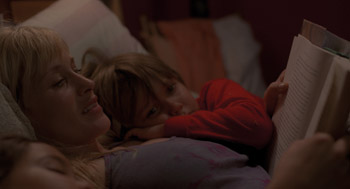 Boy
BoyOne of the early cruxes of Boyhood was finding the boy. 'We were looking for someone to come along with us for 12 years – and that's not something a kid can fathom at 6 or 7," Richard Linklater notes. 'So it was kind of a crazy task, where I was looking at kids wondering, -Who are you going to be when you grow up and what's your life going to be like?"
He found he had an instinctual answer to that answer when he auditioned Austin native Ellar Coltrane. 'I had the feeling Ellar Coltrane was going to be an artist of some kind even at that age, in part because his parents are both artists but also there was just something unique about him," Richard Linklater remembers. 'And I felt the world he was growing up in would lend itself to what we were doing. It became more and more apparent how smart and interesting Ellar Coltrane was, and it was a pleasure just watching his life unfold. He became more and more of an active collaborator every year."
For Ellar Coltrane, becoming part of Boyhood meant having a boyhood unlike any other, one that would ultimately be bracingly exposed on the screen. But, in the beginning, he really had no idea what he was in for, or what it all meant. 'It wasn't possible for me to fathom it," he explains. '12 years was already twice my lifetime at the point when we started. It's hard enough to contemplate the next 12 years now for me, or probably at any age, but then it wasn't possible. It wasn't for several years that it really began to sink in just what the film was or why it was so different."
At the same time, Ellar Coltrane looks back now and is glad that he was able to work for those years in a private space unseen by the world. 'I'm extremely grateful to have delayed having to be confronted right away with seeing myself on screen and being seen," he comments. 'It's something that I think I'm more equipped to deal with now than I would have been at the start of this process."
Even Ellar Coltrane's memories of early production have that blurry childhood haze over them, with only flashes of direct memory. He recalls that at first he was strongly guided by Richard Linklater and did a lot of memorisation. But as he grew along with Mason, the process gradually opened up and he began to assert his own creative instincts more and more, which became more and more satisfying.
'Richard Linklater and I would usually start each new year by talking about where I was at and then incorporating some of that into the character," he recalls. 'Over time, my life and my character's life began to meet in places and I became a bigger part of creating who Mason was. As a kid, of course, everything feels much more simple and now there's so much more that I can see now about how dense and complicated this family's relationships are. I think, in many ways, being part of the film gave me more perspective on relationships, especially my relationship with my own mom which, like Mason's, is complicated."
Richard Linklater says that in many ways Ellar Coltrane advanced beyond where he thought Mason might be, but Ellar Coltrane comments: 'There were times when I was getting a bit out there, but I think along the way my sensibilities mellowed a bit while Mason's expanded."
The extreme intimacy of being with the cast and crew every year for most of his life gave Coltrane a kind of second family. 'Even now, I consider Richard Linklater and Lorelei Linklater and many other people from the production to be among my closest friends," he says. 'I think a lot of the relationships in the film came so naturally because we really did form a kind of family."
Finding Mason's sister, Sam, was an easier process because Linklater already knew someone close to home who wanted the part: his then 9 year-old daughter Lorelei Linklater. 'She was at that age when she was singing and dancing and being extroverted and at that moment, she really wanted to do it," he recalls. 'It was also a really practical choice because I at least had a little bit of control over her availability."
Still, Richard Linklater could not anticipate the ways in which his daughter might change her mind, or her relationship to the project, in the ensuing years. 'A few years into the film, she became much more interested in the visual arts, where she has a lot of talent, and less interested in performing. At one point, when she really didn't want to dress up a certain way, she came to me and asked -Can my character die?" he laughs. 'In a lot of ways, Lorelei Linklater isn't much like Sam at all, but participating in the film probably meant different things to her at different times. I think the artist in her ultimately appreciated the scope of the thing she was involved in, however awkward it had been at times."
The palpable link between Lorelei Linklater and Ellar Coltrane also shifted over the years, mirroring the subtle evolution that siblings often go through. 'Sister and brother is a really kind of awkward relationship when you're a kid, and we had that in the beginning because we were more stand-offish with each other at first, and there was more a feeling of rivalry. But that changed a lot as we got older," Ellar Coltrane explains. 'Today, I really value my relationship with Lorelei Linklater because she is the only other person who has been through this same strange experience of growing up in this film – and who really understands what that was like, to go through this and come out the other side. It's so nice to have her to talk to."
For Patricia Arquette, working with both Ellar Coltrane and Lorelei Linklater was often a revelation. 'I can't say enough how great they were," she says. 'It was just so cool to see them changing so quickly and so beautifully right in front of us."
Mom
Boyhood is almost just as much a view of motherhood, as the dance between mother and son plays out while Mason begins in all kinds of ways to assert his independence. To take the part of Olivia, who starts out a struggling, overwhelmed single mom yet wills herself to become an accomplished teacher and the parent of two remarkable adult children, Richard Linklater chose Patricia Arquette. A three-time Golden Globe Award nominee for her role on the television series 'Medium," and recently seen as Sally Weet on HBO's acclaimed 'Boardwalk Empire," Arquette is also known for memorable performances in such films as Tim Burton's Ed Wood and Tony Scott's True Romance
But Boyhood was like nothing she'd ever encountered in film before.
'When Richard Linklater called I was so excited just to be part of this. I remember he said -What are you doing for the next 12 years?' – which is really the best sort of come on," Patricia Arquette laughs. 'There was no script, and it wasn't a movie you could easily categorise, but his idea was so amazing, no one had done it before, so I thought I will find a way to make this work in my schedule for the next 12 years some way and somehow. Committing to it was the easiest thing for me."
Richard Linklater had never worked with Patricia Arquette before and had only met her once, but he says that from their first conversation, he knew she was a good match for the role. 'I really liked that she had also been a mom at a young age because it was so important to the character," he says. 'Over the phone, we were immediately collaborating, immediately talking about our moms and what they were like when we were growing up and she also had so much to say about parenting."
'Patricia Arquette's really an artist and she fearlessly tapped into the character," the director continues. 'She didn't mind diving into the ambiguities of Olivia. She just went with them. Olivia is flawed, and she could be seen as passive at times, but I also consider her a brave mom – a woman who was always trying to balance her own passions with doing the best that she could for her kids."
Patricia Arquette says part of the reason she felt able to fearlessly jump was her trust in Richard Linklater. Though this was the first time they had worked together, she got a sense right away that it was going to be the kind of creative collaboration that pushes a person into new territory. 'Richard Linklater's whole way of being is to always be calm, supportive and clear in his vision," she observes. 'It was incredible to me that he never came in with an agenda to make a certain kind of movie or allowed what we were doing to be cheapened. He really followed his instincts and stayed open to the changes that were happening as we made the film."
Getting to know Olivia was also quite different for Patricia Arquette from any other character she has played. 'It's one thing to approach a character when you have an arc that's fully plotted out but here, especially in the beginning, there was so much that I didn't know, that I couldn't know. So that means you play things differently, which I think was good for this story," she comments.
Patricia Arquette continues: 'The character was always revealing herself to me. I had no preconceived conceptions of her. At the very start, Rick asked me to just hang out with Ellar Coltrane and Lorelei Linklater so we had sleepovers, we spent days doing art projects. It was a process of finding these relationships in a real way. I was never quite sure what was playing out at the time, but I trusted in it. And there were always these fast-moving, emotional undercurrents that resonated as a human being that I never felt in another movie."
As a mother herself, Patricia Arquette brought some of that to her work, but she says that in the end, Olivia became an amalgam of many influences and many mothers. 'There are similar aspects to me in Olivia, and many dissimilar aspects," she says, noting that like Olivia, her own mother went to school to become a teacher when she was a child. 'For example, the scene late in the film where Olivia watches Mason going off to school was really quite the opposite of that same scene in my life when my son went off to school, but I also remember it being very intense and heavy, and it seemed to me that Olivia's was an equally human and valid kind of reaction."
Olivia's interactions with men – with her children's father, Mason Sr., as well as a series of challenging, at times abusive, partners she takes up with along with the way – also fascinated Patricia Arquette, revealing as they do the way we all struggle to really see other people for who and what they are.
'I think with Mason Sr., she has sort of put him in this permanent box labeled irresponsible and she sees herself as the only one who has done the hard, day-to-day work of raising these kids. But, of course, she also never sees her ex when he is with the kids, or what kind of father he is really like," she notes. 'And then along the way, she also starts to make some radically sad personal choices – yet she truly believes she's making all the right choices. She thinks she's doing what she should be doing for her kids, looking for a stable situation for them, but she can't see - not the way we can looking back at it -- that she is sometimes wearing blinkers."
Despite the blinders, despite the inevitable stumbles and dangers, Olivia is rewarded with two intriguingly strong, sensitive young adults who really do seem ready, as ready as any of us ever are, to take on the modern world.
'What I love is watching Mason, who starts out as this kind of spacy, dreamer kind of little kid develop into this really exciting young artist and man," Patricia Arquette concludes. 'As disappointing as his parents' relationship was to him, somehow, he becomes a mix of their individual strengths. He has his father's free-spiritedness and his mother's sense of being responsible and caring about others. And he has become someone amazing."
Dad
Mason's boyhood is one of divorce – as are the childhoods of 50% of Americans -- and also one where his father remains a lost cipher until he suddenly pops back into the family's life just as the story is beginning. Playing Mason Sr. is Richard Linklater's long-time collaborator Ethan Hawke, a three-time Academy Award® nominee, including sharing Best Adapted Screenplay honors with Richard Linklater for Before Sunset and Before Midnight. An accomplished writer and director himself, Ethan Hawke is known for wide range of roles, including the genetically modified man of Gattaca, the rookie narcotics officer of Training Day, a modern-day Hamlet, the reluctant brother in Only The Devil Knows Your Dead, and the lover turned unexpected partner of the Before series.
When Boyhood began in 2002, Richard Linklater had already worked with Ethan Hawke a number of times and had mentioned Boyhood to him, eliciting instant excitement.
'To make one movie over a 12-year period was the most incredibly unique idea," recalls Ethan Hawke. 'I'd never been involved in anything like it. And I don't think anything like it has been done. People sometimes hear the idea and think -oh, it's like a documentary' or it's similar to Michael Apted's 7-UP. But this isn't a documentary – it's a narrative film made over 12 years, which is something quite different. It's rare to see someone trying to use the medium in a new way, to explore time in a new way, as Richard Linklater wanted to do."
Ethan Hawke had few qualms about the commitment. 'I remember Richard Linklater was concerned that I would get too busy and wouldn't be able to clear the time in my schedule, but I told him I really believe in this and we will work around the barriers. It became a giant good-will juggling act for the next 12 years. But if you really believe in something, you find a way."
Once he jumped in, Ethan Hawke would take Mason Sr. through changes almost as dizzying as those his young son goes through, as he too wanders through a kind of late coming-of-age – and goes from a GTO-driving, Alaska-trekking, barely-making-it musician to an insurance guy in a mini-van with a second family, though his playful instincts never fade.
'As soon as we meet Ethan Hawke's character, he's already made a big decision: that he's going to be a part of his kids' lives, that he's going to try to be a good dad," says Richard Linklater. 'I think he's someone for whom parenting came chronologically before his maturity, so when we meet him, he's still learning to become a functioning adult."
Ethan Hawke adds: 'He's a guy who grows up, but that growing up also comes with a cost to him. He gives up his own artistic dreams to be a more decent father. Over time, like a lot of men, he takes on a mask – the insurance guy – but part of him is still in the art world."
The tricky subject of part-time fatherhood was especially intriguing to Ethan Hawke, who is both the child of divorce and went through one during the span of time that Boyhood was in production. 'I think the impact of divorce both as a child and a parent is an interest that Richard Linklater and I share – and it's something we also explored a bit in Before Midnight, but in a different context," he notes.
Richard Linklater purposefully kept Ethan Hawke out of the first year's shoot to further emphasise that sense of a father who only sees his kids on occasions and has to break through that wall of shyness and mistrust because he's out of the loop of their day-to-day lives. At the same time, Hawke says there was always a very close intimacy on the set.
'One thing about Richard Linklater is that he has this unbelievably relaxed style of directing that is really conducive to working with young actors like Lorelei Linklater and Ellar Coltrane. He has a mix of patience and compassion that gets to something very real. In truth, I've known Lorelei Linklater since she was a baby, so this was a wonderful thing for us to share. And as for Ellar Coltrane, he was sort of thrown into the Twelve Year Richard Linklater Artistic Program. I do think what he went through was something very intense. More than any of us, he was on uncharted ground."
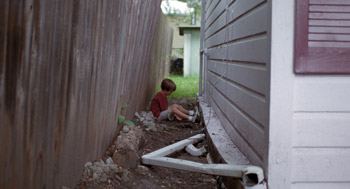 As filming continued, the naturalism of the performances astonished Ethan Hawke. 'Stanislavski would be absolutely exhilarated by this film," he laughs, referring to the legendary acting teacher who advocated for an ideal of unvarnished truth.
As filming continued, the naturalism of the performances astonished Ethan Hawke. 'Stanislavski would be absolutely exhilarated by this film," he laughs, referring to the legendary acting teacher who advocated for an ideal of unvarnished truth. 'There's nothing documentary about it, but the film seduces you into believing these characters are real," Ethan Hawke observes. 'That's why even the tiniest minutiae of their lives is so engaging."
In keeping with the realism, Ethan Hawke even wrote several songs for his song-writing character and performs them in the film. He says Rick Linklater's openness to letting life and fiction merge into one fabric is what kept the flow going so strongly for 12 years. 'The truth is that Richard Linklater was incredibly receptive to whatever happened," he summarises. 'So in hindsight things might look lucky – but there was something more going on. He was working patiently with what reality gave him."
Shifts
A dynamic sense of motion underlies the structure of Boyhood, allowing the audience to be acutely conscious of time's trajectory and time's pull, even as they are caught in the grip of the day-to-day events unfolding throughout Mason's youth.
For Richard Linklater, a major part of the concept was allowing the film to feel all of one fluid piece, as a life does, rather than reflecting the project's stops and starts. On the technical end, this meant sticking with his original choices. 'I wanted the look to always be unified, knowing that the culture and the characters would change within that look," he explains. 'So that meant keeping all the formal elements of the film the same throughout."
Even his decision to shoot entirely on 35mm was a gamble, since film itself was becoming a fading format. 'Towards the end of production, it became harder and harder to shoot on 35mm," he reflects. 'But it helped give us that seamless flow."
There was little need to clue the audience in that time had moved ahead from scene to scene since it was written on his two young actors' faces. 'Every time we started to shoot, you could see various indicators in Ellar Coltrane and Lorelei Linklater that things had changed," Richard Linklater comments.
He also explored the never-ending transitions in the cultural biosphere over the 12 years – using clothes, design trends, the morphing tech devices that have become entwined in our lives, and especially music, to demarcate even subtle shifts in era.
Of the music, Richard Linklater says: 'Usually, I pick songs for my films that are meaningful to me – but here I was thinking about what would be meaningful to Mason. I wanted the music to mirror the culture at the moment, but that was kind of a challenge."
Ellar Coltrane was little help to Linklater because he had unusually eclectic and retro taste. So he brought in several young consultants to give their opinions and personal recollections of the most resonant tracks from the early 2000s and beyond. From Weezer and Coldplay in Mason's early childhood to Arcade Fire and Daft Punk towards the end of the film, snippets of music both place the film in time and help to carve out its pendulum span of moods.
'What really mattered to me was that someone had a really emotional experience with these songs," boyhood2.jpg explains, 'so I looked for a lot of personal feedback. And then, as Mason grows up, the music converges more and more with his development and taste." In terms of keeping seamless continuity over so many small shoots, a lot of it came down to carefully working out as much as possible in pre-production - scouting locations and doing casting work well in advance so that there were no surprises in those areas. There were occasional snafus, but Linklater says most of it went surprisingly smoothly.
'It became a bit like getting together every year at camp," he laughs. 'We had this core group of people who united every year for 12 years and it really did become like a family in its own way. But it also kept growing, and we ultimately had 143 cast members and over 400 crew. It did seem to get a little tougher every year to pull it all together, but I think we all felt increasingly that we were in a creative groove together."
By the time shooting wrapped, the film was nearly formed since boyhood2.jpg and Sandra Adair had been working throughout on the cut. The final editing was minimal. 'It was all kind of working," the director recalls. 'It was a longer than I had originally conceived; I had originally thought 10 minutes per year, adding up to 120 minutes. But I realised after the first year that wasn't exactly how it was going to work. I decided to let the film be what it wanted to be without imposing that kind of restriction. Ultimately, it's both kind of an epic and yet, at the same time, very simple and intimate."
Seeing the film for the first time was an emotional, even cathartic, experience for the cast. Richard Linklater suggested Ellar Coltrane and Lorelei Linklater watch it alone several times. Ellar Coltrane says he was grateful for the suggestion. 'It was very intense because I was looking at a side of myself I wouldn't normally see," he explains. 'And at that same time that it was so deeply personal, it was also very broad and amazing to me. It's such a window into human existence, and in many ways the main character is, as Rick says, time itself. I've never seen anything else like it. It was so much a part of my life, but I think it will be really universal because it gets to something a lot of us are missing– that appreciation of moments for what they are."
Patricia Arquette waited to see the film with an audience at its premiere screening at the Sundance Film Festival. 'At first I felt so fiercely protective of this experience, I almost didn't want anyone else to see it," she muses. 'But it was amazing to see how people became so engaged with it in their own ways. That was really beautiful."
Richard Linklater says that one of the most stirring moments of the whole production came for him at the very end, while shooting the last scene, as Mason, no longer a boy, heads into the mountains, and into the vast unknown, on his first day at college. There is a sense that Mason's life could take any infinite number of turns from this point forward, but all we know for sure is where he has been.
'I remember standing there and the sun was setting and there was just this incredible vibe," Richard Linklater recalls. 'It was the final shot of a 12-year experience and there's just no way to describe that feeling. It's not something that can be repeated."
Boyhood
Release Date: June 6th, 2014
Have You Seen This?
MORE
- Mission: Impossible Fallout
- Glenn Close The Wife
- Allison Chhorn Stanley's Mouth Interview
- Benicio Del Toro Sicario: Day of the Soldado
- Dame Judi Dench Tea With The Dames
- Sandra Bullock Ocean's 8
- Chris Pratt Jurassic World: Fallen Kingdom
- Claudia Sangiorgi Dalimore and Michelle Grace...
- Rachel McAdams Disobedience Interview
- Sebastián Lelio and Alessandro Nivola...
- Perri Cummings Trench Interview

